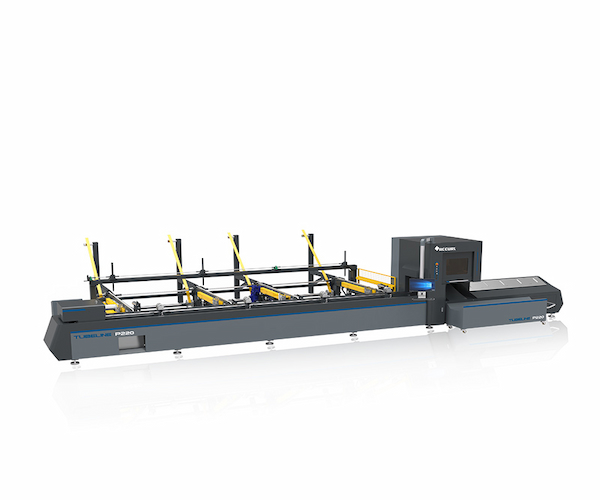ما هي نقاط الاختراق المستقبلية لآلة قطع أنبوب الليزر الليفي؟
Jul 10, 2025
1. الترقية إلى الذكاء والأتمتةتحسين عملية الذكاء الاصطناعيمن خلال التحليل في الوقت الحقيقي لمعلمات القطع (الطاقة والسرعة وضغط الهواء وما إلى ذلك) بواسطة الذكاء الاصطناعي، يتم إجراء تعديلات تلقائية لتقليل معدل الخردة والتكيف مع أنواع مختلفة من الأنابيب (مثل الفولاذ المقاوم للصدأ وسبائك الألومنيوم وأنابيب النحاس).على سبيل المثال، يقوم نظام الرؤية بالذكاء الاصطناعي تلقائيًا بتحديد عيوب الأنابيب أو التشوهات وتصحيح مسار القطع بشكل ديناميكي.العملية برمتها غير مأهولة بالكاملدمج أنظمة التحميل والتفريغ والفرز والتعبئة الأوتوماتيكية، ودمجها مع لوجستيات AGV/RGV لتحقيق إنتاج آلي على مستوى "المصنع المظلم".التوأم الرقمي والتشغيل والصيانة عن بُعدمن خلال المحاكاة الافتراضية لمعاينة عملية القطع، ومراقبة حالة المعدات عن بعد والتنبؤ بالأخطاء (مثل تحذير عمر الليزر).2. تقنية الليزر عالية الطاقة والسرعة الفائقةليزر الألياف ذو الطاقة العالية (>30 كيلو واط)تحسين كفاءة قطع الأنابيب ذات الجدران السميكة (مثل الفولاذ الكربوني ≥50 مم)، وتقليل أخطاء التشطيب في نفس الوقت، واستبدال بعض سيناريوهات القطع بالبلازما/اللهب.التحدي: من الضروري معالجة التحكم في التشوه الحراري واستقرار جودة الشعاع عند الطاقة العالية.تطبيقات الليزر فائق السرعة (بيكوثانية/فيمتو ثانية)بالنسبة للأنابيب الطبية الدقيقة والأنابيب ذات الجدران الرقيقة ذات الشكل غير المنتظم (مثل الدعامات القلبية الوعائية)، يتم تحقيق قطع المنطقة المتأثرة بالحرارة لتقليل عمليات التلميع اللاحقة.3. الربط متعدد المحاور وقدرات المعالجة المعقدةالحركة المركبة لـ 7 محاور أو أكثرمن خلال إضافة محور دوران (مثل رأس التأرجح) والتحكم الديناميكي في التركيز، يمكن تحقيق قطع لمرة واحدة لأنابيب السطح المنحنية ثلاثية الأبعاد (مثل أنابيب عادم السيارات ومكونات الفضاء).الكشف عبر الإنترنت والتعويض في الوقت الفعليدمج قياس المدى بالليزر أو المسح ثلاثي الأبعاد لتصحيح الأخطاء الناجمة عن ثني الأنابيب أو إزاحة التثبيتات في الوقت الفعلي أثناء عملية القطع.4. توسيع القدرة على التكيف مع الموادقطع الأنابيب المركبةاختراق الاختناقات الفنية للمواد التي يصعب معالجتها مثل الأنابيب المطلية (مثل الأنابيب المجلفنة) وأنابيب ألياف الكربون المركبة، وتقليل التقشر أو التآكل.الحل: الليزر المعدل بالنبض + تحسين الغاز المساعد (مثل خليط النيتروجين / الهيليوم).المعالجة المسبقة قبل لحام الأنابيب المعدنية غير المتشابهةمن خلال عملية متكاملة من التنظيف والقطع بالليزر، يتم توفير قطع عالية النظافة لعملية لحام الأنابيب المعدنية غير المتشابهة مثل النحاس والألومنيوم.5. التصنيع الأخضر والتنمية المستدامةتحسين استهلاك الطاقةمن خلال اعتماد محرك التردد المتغير ونظام استعادة الطاقة، يتم تقليل استهلاك الطاقة لوحدة آلة قطع الأنابيب بالليزر الليفي (حاليًا حوالي 3-5 كيلو وات · ساعة / ساعة).استبدال العملية الصديقة للبيئةتقليل تكوين بقع الزيت والغبار في القطع التقليدي، على سبيل المثال، عن طريق استبدال إزالة الغبار الرطب بالقطع الجاف.تحسين معدل استخدام الموادمن خلال استخدام برنامج تخطيط الذكاء الاصطناعي، تم زيادة معدل استخدام الأنابيب من 70% إلى أكثر من 90%، مما يقلل من النفايات.آفاق سيناريوهات التطبيق المستقبليةمركبات الطاقة الجديدة: قطع فعال لأنابيب هيكل حزمة البطاريات وخزانات تخزين طاقة الهيدروجين.تصنيع البناء: المعالجة السريعة لأنابيب الهياكل الفولاذية المعقدة في المباني الجاهزة.القطع الدقيق لأنابيب مقاومة للضغط من سبائك التيتانيوم للمعدات الفضائية ومعدات أعماق البحار.ملخص:الاختراقات المستقبلية آلات قطع الأنابيب بالليزر الليفي ستتمحور هذه التوجهات حول "الذكاء والدقة والمحافظة على البيئة"، بينما سيصبح الاستبدال المحلي والتكامل التكنولوجي (مثل الذكاء الاصطناعي + الليزر) قوى دافعة رئيسية. يتعين على الشركات الاهتمام بالمتطلبات المخصصة في المجالات ذات القيمة المضافة العالية (مثل الرعاية الصحية والفضاء) لاغتنام فرص السوق.إذا كان لديك المزيد من الأفكار، يرجى الاتصال بنا!هاتف: +86 -18855551088بريد إلكتروني: Info@Accurl.comواتساب/جوال: +86 -18855551088
